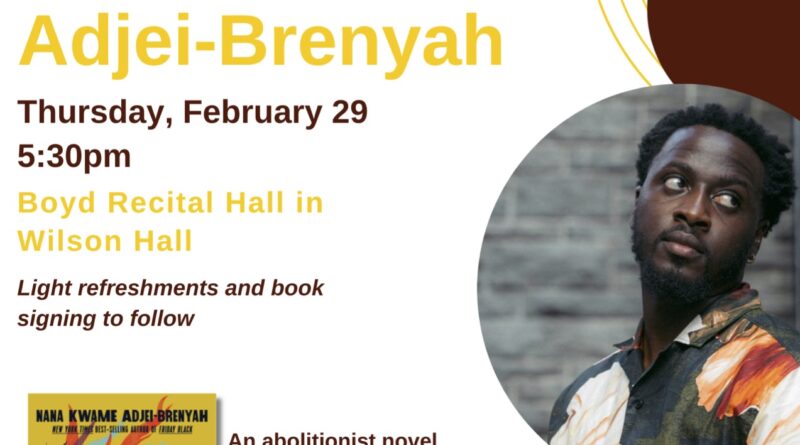A reading of Chain-Gang All-Stars ahead of author’s visit to Rowan
Writing Arts is proud to host an evening with New York Times best-selling author and National Book Award nominee Nana Kwame Adjei-Brenyah on Thursday, Feb. 29th at 5:30pm in Boyd Recital Hall! During the event, Adjei-Brenyah will read from his debut novel Chain-Gang All-Stars (now out in paperback), and he will give a talk followed by a Q&A. Light refreshments and a book signing will follow. Books will be available for purchase at the event.
In the near future, for-profit prisons will establish a program where life-sentence inmates can earn their freedom through a series of competitions broadcast around the US like the NFL. The lone champion of each season is the one who successfully kills all their opponents through “hard-action sports,” a combination of weaponed and hand-to-hand combat. That means the only way to reenter society is to murder further. It’s a win-win for the program’s board of directors, who’ve found a way to let the death penalty take care of itself while selling advertising space for it. The fighters are branded with tattooed logos of WholeMarket™, LifeDepot™, Wal-Stores™ and McFoods™. It’s very Orange is the New Black meets Hunger Games with a cyberpunk aesthetic. The brutality and gore can be a lot, so if you are squeamish or sensitive like me, pace yourself and don’t read too late at night.
the near future, for-profit prisons will establish a program where life-sentence inmates can earn their freedom through a series of competitions broadcast around the US like the NFL. The lone champion of each season is the one who successfully kills all their opponents through “hard-action sports,” a combination of weaponed and hand-to-hand combat. That means the only way to reenter society is to murder further. It’s a win-win for the program’s board of directors, who’ve found a way to let the death penalty take care of itself while selling advertising space for it. The fighters are branded with tattooed logos of WholeMarket™, LifeDepot™, Wal-Stores™ and McFoods™. It’s very Orange is the New Black meets Hunger Games with a cyberpunk aesthetic. The brutality and gore can be a lot, so if you are squeamish or sensitive like me, pace yourself and don’t read too late at night.
The perspective of each chapter shifts between an omniscient narrator observing the competitors, reporters, CEOs, and protesters, and first-person accounts of prisoners. The chapters I found most compelling were those about the fans of hard-action sports. In the stands at a game, a husband cheers and curses with a beer in hand while the wife hides her face. At home, her feigned embarrassment is replaced with guilty pleasure as the two stream replays together. She lets him explain the rules to her so they can bond.
In this future, prisons are co-ed. Inmates’ queerness and pronouns are accepted by the general public. They are celebrated as star athletes and role models. At public service events, children ask them for photos. They are well-fed, can use the internet, and are allowed to have romantic relationships with other inmates. But they’re only afforded all these rights because they’re profitable. It makes for good entertainment. Even when not in the arena, everything they do is live-streamed via drone cameras that follow them everywhere. Viewers get reality TV and soap operas when they’re not getting action and competition. These rights likewise don’t protect them from being punished if they step out of line.
The state uses “Influencing,” an innovative torture technique that activates all the pain receptors in the body: “They had been on day six of their hunger strike when the guards had thrown her into isolation and told her she would be Influenced. She’d seen the smiles on some, heard stories of eyes ripped from skulls, had begged them not to do it. They’d said, ‘Let’s see how ready you are,’ and stabbed a black rod connected to a wire and finally a controller into her thigh” (p. 251). Members of the public can be Influenced, too. Protesters who argue hard-action sports are neo-slavery are permitted to picket as long as they don’t get too rowdy, otherwise the rods could be applied to them.
This doesn’t mean this future is a completely despairing place. There is hope that all involved realize much is wrong with the whole system. The book has something optimistic to say about the power of solidarity. It also has a lot to say about love and humanity, which are juxtaposed with the brutality and violence. It presents forms of love like empathy, admiration, romantic, familiality, and friendship. The fans love their star athletes. The shareholders love them, too. What does love mean in this context?
There are questions raised about choice as well. With lawyers present, prisoners have the choice to opt into this “athletic” program. They can weigh the ethical and moral implications of each option. What other choices do they have? How about the spectators? The game will be played whether we watch it or not. It is what it is. Or are we all implicit? Who has the power: the board of directors, or each of us?
And, finally, freedom. Winning freedom involves accruing traumas along the way, including being pit against loved ones in the ring.  Is reintegration really possible for winners? Is freedom as simple as being released from prison?
Is reintegration really possible for winners? Is freedom as simple as being released from prison?
Is someone as bad as the worst thing they’ve ever done?
Rowan students and staff can download Chain-Gang All-Stars for free from the Campbell Library database. Thank you to the members of the Chain-Gang All-Stars Book Study Group for sharing your readings and helping to inform mine.
Chain-Gang All-Stars was longlisted for the Center for Fiction’s 2023 First Novel Prize, was a finalist for the National Book Award in Fiction, and was named as one of the New York Times’ “10 Best Books of 2023.”

